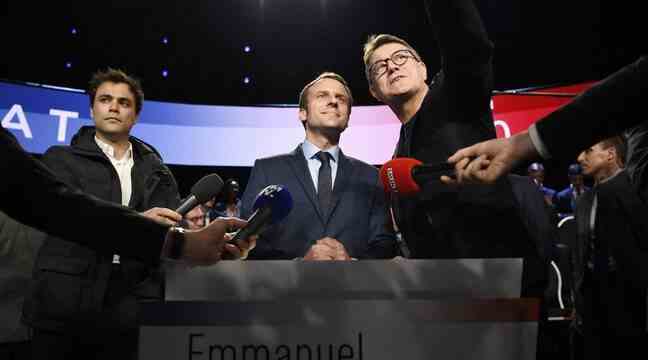This Wednesday, Emmanuel Macron had lunch with the Dutch Prime Minister, Mark Rutte. On the eve of the European Union summit in Versailles, there was probably little talk of the presidential campaign in France. Too bad: Emmanuel Macron could have asked his counterpart how he managed during the last elections in his country, in 2021, when he was outgoing… no less than four radio and television debates against the other candidates. Very little for Emmanuel Macron, who confirmed, Monday evening, on the sidelines of his trip to Poissy, that he would not make confrontations before the first round with his opponents.
Why ? “No incumbent president who is standing for re-election has done so. Why would I do it differently? “, Argued the candidate president. It is factually true. The two debates organized in 2017 (on TF1 with the 5 main candidates and on CNews and BFMTV with the 11 candidates) were the first real debates before the first round of a presidential election organized in France. And there was no outgoing in their ranks. The outgoing one, François Hollande, even found “the dreadful idea” and “dangerous”, nothing less. In France, the practice has been the duel between the two rounds since 1974. There was only one exception, in 2002, when Jacques Chirac refused to debate with Jean-Marie Le Pen.
“Democratic Immaturity”
Oppositions are outraged, but basically not surprised. “There is a form of systematic dodging”, judge Valérie Pécresse this Wednesday, she who has been crying out for a debate with all the candidates for weeks. “It’s unbelievable that he decides not to participate in debates. He is in the continuity of his monarchist presidency”, chokes the rebellious deputy Eric Coquerel, who wants all the same to try to “put pressure” on the candidate president. Nathalie Arthaud, meanwhile, “regrets” Emmanuel Macron’s decision.
The historical argument put forward by the presidency is considered unconvincing: it would be a first, yes, but “it would also be progress”, noted a month ago in Le Figaro Pascal Perrineau. At the same time, the political scientist, usually balanced, did not have words harsh enough on Public Senate to qualify a possible refusal to debate Emmanuel Macron: “There is a disturbing sign of democratic immaturity, of continuity of monarchical reflexes which belong to another time. (…) It’s insane, it’s incomprehensible! “We pass for old-fashioned,” he blurted, even, with regard to European standards.
The case of France almost unique in Western Europe
From these standards, France is still far, very far. Mark Rutte, since we have given his example, Prime Minister of the Netherlands since 2010, has participated in a dozen debates – just during the election period – against his opponents since he took office. Pedro Sanchez in Spain, Antonio Costa in Portugal, Boris Johnson in the UK. In Denmark, Norway, Sweden. Even Angela Merkel in her time… All the incumbents are debating with their opponents before the elections. And most often rather twice than once. In the Scandinavian countries, it is not even uncommon to see the Prime Minister in office taking part in this type of contest with the leaders of the other parties outside the electoral period. Very exotic political mores for France.
Among walkers, Emmanuel Macron’s decision is obvious. “It’s all been said, right? we hear ourselves say when we try to discuss the subject. On France Inter, government spokesman Gabriel Attal simply added that he wanted to avoid “a rat race” where the president would be alone against everyone to defend his record. But isn’t this the principle of an electoral campaign for the incumbent?
Counter format
Five years after the disruption campaign, Emmanuel Macron has therefore returned to the – very comfortable – rank of the Fifth Republic. Certainly, we do not learn it today. But for Luc Rouban, from Cevipof, interviewed by 20 minutes, this marks a change in macronism. “We are far from the horizontality displayed in 2016-2017. It’s more vertical now. The discourse outside parties, and right, and left, of 2017 has turned into a discourse above parties. Macronism is much more Gaullist in 2022”. All this in a context where “distrust and democratic malaise has not disappeared”.
Result: no debate. Or formats where the candidates follow one another at the table all evening long, as on France 2 in April 2017. A kind of “wicket format”. The first will take place on Monday evening, on TF1. And why not debates, but without Emmanuel Macron? The rebellious deputy Eric Coquerel wonders: “It is not possible for the media to comply with the wishes of the president, it is a democratic duty. It will not be necessary to come then to shed crocodile tears on the abstention. Complicated because of the speaking time rules.
There is nevertheless a precedent: in 2012, France 2 had organized a debate in confrontation… But where Nicolas Sarkozy was represented by a spokesperson. As a result, neither François Hollande, nor Marine Le Pen, nor Jean-Luc Mélenchon were there either. The debate without the leading quartet had been broadcast in the second part of the evening. Organizing a debate with everyone but without Macron, the risk is to record that the presidential campaign has definitively transformed into a political version of “Everyone wants to take their place”: with challengers against a champion who, him , only makes it to the final.

